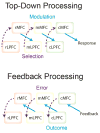Frontal Cortex and the Hierarchical Control of Behavior
- PMID: 29229206
- PMCID: PMC5841250
- DOI: 10.1016/j.tics.2017.11.005
Frontal Cortex and the Hierarchical Control of Behavior
Abstract
The frontal lobes are important for cognitive control, yet their functional organization remains controversial. An influential class of theory proposes that the frontal lobes are organized along their rostrocaudal axis to support hierarchical cognitive control. Here, we take an updated look at the literature on hierarchical control, with particular focus on the functional organization of lateral frontal cortex. Our review of the evidence supports neither a unitary model of lateral frontal function nor a unidimensional abstraction gradient. Rather, separate frontal networks interact via local and global hierarchical structure to support diverse task demands.
Keywords: cognitive control; executive function; frontal lobes.
Copyright © 2017 Elsevier Ltd. All rights reserved.
Figures







References
-
- Duncan J, et al. Intelligence and the frontal lobe: the organization of goal-directed behavior. Cogn Psychol. 1996;30(3):257–303. - PubMed
-
- Logan GD, Gordon RD. Executive control of visual attention in dual-task situations. Psychol Rev. 2001;108(2):393–434. - PubMed
-
- Miller EK, Cohen JD. An integrative theory of prefrontal cortex function. Annual Review of Neuroscience. 2001;24:167–202. - PubMed
-
- Stuss DT, Benson DF. The frontal lobes and control of cognition and memory. In: Perecman E, editor. The Frontal Lobes Revisited. The IRBN Press; 1987. pp. 141–158.
-
- Badre D. Cognitive control, hierarchy, and the rostro-caudal organization of the frontal lobes. Trends Cogn Sci. 2008;12(5):193–200. - PubMed
Publication types
MeSH terms
Grants and funding
LinkOut - more resources
Full Text Sources
Other Literature Sources

